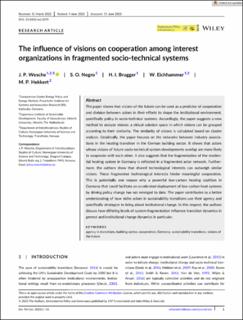| dc.contributor.author | Wesche, Julius Paul | |
| dc.contributor.author | Negro, S.O. | |
| dc.contributor.author | Brugger, H.I. | |
| dc.contributor.author | Eichhammer, W. | |
| dc.contributor.author | Hekkert, M.P. | |
| dc.date.accessioned | 2024-02-01T12:05:10Z | |
| dc.date.available | 2024-02-01T12:05:10Z | |
| dc.date.created | 2023-08-23T15:06:07Z | |
| dc.date.issued | 2023 | |
| dc.identifier.citation | Environmental Policy and Governance. 2023, . | en_US |
| dc.identifier.issn | 1756-932X | |
| dc.identifier.uri | https://hdl.handle.net/11250/3115055 | |
| dc.description.abstract | The paper shows that visions of the future can be used as a predictor of cooperation and division between actors in their efforts to shape the institutional environment, specifically policy in socio-technical systems. Accordingly, the paper suggests a new method to analyze visions: a virtual solution space in which visions can be grouped according to their similarity. The similarity of visions is calculated based on cluster analysis. Empirically, the paper focuses on the networks between industry associations in the heating transition in the German building sector. It shows that actors whose visions of future socio-technical system developments overlap are more likely to cooperate with each other. It also suggests that the fragmentation of the residential heating system in Germany is reflected in a fragmented actor network. Furthermore, the authors show that shared technological interests can outweigh similar visions. These fragmented technological interests hinder meaningful cooperation. This is potentially one reason why a powerful low-carbon heating coalition in Germany that could facilitate an accelerated deployment of low-carbon heat systems by driving policy change has not emerged to date. The paper contributes to a better understanding of how niche actors in sustainability transitions use their agency and specifically strategize to bring about institutional change. In this respect, the authors discuss how differing levels of system-fragmentation influence transition dynamics in general and institutional change dynamics in particular. | en_US |
| dc.language.iso | eng | en_US |
| dc.publisher | Wiley | en_US |
| dc.rights | Navngivelse 4.0 Internasjonal | * |
| dc.rights.uri | http://creativecommons.org/licenses/by/4.0/deed.no | * |
| dc.title | The influence of visions on cooperation among interest organizations in fragmented socio-technical systems | en_US |
| dc.title.alternative | The influence of visions on cooperation among interest organizations in fragmented socio-technical systems | en_US |
| dc.type | Journal article | en_US |
| dc.type | Peer reviewed | en_US |
| dc.description.version | publishedVersion | en_US |
| dc.source.pagenumber | 0 | en_US |
| dc.source.journal | Environmental Policy and Governance | en_US |
| dc.identifier.doi | 10.1002/eet.2070 | |
| dc.identifier.cristin | 2169110 | |
| cristin.ispublished | true | |
| cristin.fulltext | original | |
| cristin.qualitycode | 1 | |

